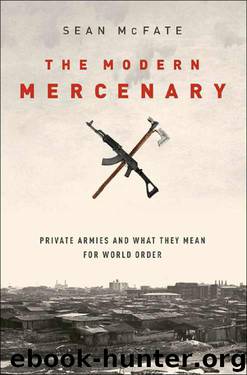The Modern Mercenary: Private Armies and What They Mean for World Order by Sean McFate

Author:Sean McFate [McFate, Sean]
Language: eng
Format: epub, pdf, azw3, mobi
Publisher: Oxford University Press
Published: 2014-07-13T21:00:00+00:00
If You Know How to Build It, You Also Know How to Use It
The most significant fact of DynCorp’s work in Liberia is that the private sector can raise an army at all. Like Wallenstein, the British East India Company, and other military enterprisers of the past, DynCorp made a military for a client and did so without external assistance other than payment. The Liberia program was not a public and private partnership involving a hybrid of US soldiers and PMC personnel working together to transform a foreign military, as has happened in Iraq and Afghanistan. Liberia’s armed forces are unique in that they were generated entirely by the private sector. Furthermore, DynCorp would have had an easier job if it had a less finicky client than the US government and a more permissive context than a large UN peacekeeping mission.
If a company can create an army, then it can deploy it, too, because the expertises are linked. This does not suggest that DynCorp secretly desired to deploy the AFL (it did not), only that it possessed the requisite skills to do so, because, like most PMCs, it enlisted most of its personnel from other military, intelligence, or law-enforcement organizations. The military is a profession that can only be taught by its own, and non-military imposters are anathema. For example, a soldier must have years of experience leading troops to be selected as a drill instructor. All of DynCorp’s instructors were military veterans, adept at commanding tactical units, and could have easily led the AFL into battle, as Executive Outcomes did in Angola and elsewhere. In some ways, this would have been desirable, since the AFL was essentially an army of entry-level privates by 2010 and in need of tactical leadership.
Another example is arming the AFL. In 2006, DynCorp bought and transported small arms from eastern Europe to Liberia, the first legal arms shipment to the country in more than two decades. The State Department helped arrange the legal aspects of the transfer, while the machinations of the deal itself were left to the firm, knowing what to buy, where to buy, whom to talk to, how to ship it, and so forth. It remains well within the company’s grasp to purchase and move small arms around the world without the support of governments. Although DynCorp had no intention of building its own army, taking over the AFL, or illegally supplying weapons to regional actors, the PMC—and others like it—currently possess the ability to do so.
DynCorp acted as a military enterpriser in Liberia, building an army for the client rather than deploying it. The benefits of hiring a private actor for this task are many and include efficiency, innovative approaches, surge capacity, ability to plumb resource pools not accessible to the client, and freedom of action as an “outsider” to stakeholder politics. But contracting also creates complications: poor teamwork between firms, principal-agent issues, asymmetries of information, lack of oversight, difficulties arising from pay problems, and conflicts of interest stemming from the profit motive.
Download
The Modern Mercenary: Private Armies and What They Mean for World Order by Sean McFate.pdf
The Modern Mercenary: Private Armies and What They Mean for World Order by Sean McFate.azw3
The Modern Mercenary: Private Armies and What They Mean for World Order by Sean McFate.mobi
This site does not store any files on its server. We only index and link to content provided by other sites. Please contact the content providers to delete copyright contents if any and email us, we'll remove relevant links or contents immediately.
| Arms Control | Diplomacy |
| Security | Trades & Tariffs |
| Treaties | African |
| Asian | Australian & Oceanian |
| Canadian | Caribbean & Latin American |
| European | Middle Eastern |
| Russian & Former Soviet Union |
The Secret History by Donna Tartt(19052)
The Social Justice Warrior Handbook by Lisa De Pasquale(12187)
Thirteen Reasons Why by Jay Asher(8893)
This Is How You Lose Her by Junot Diaz(6877)
Weapons of Math Destruction by Cathy O'Neil(6265)
Zero to One by Peter Thiel(5786)
Beartown by Fredrik Backman(5737)
The Myth of the Strong Leader by Archie Brown(5499)
The Fire Next Time by James Baldwin(5431)
How Democracies Die by Steven Levitsky & Daniel Ziblatt(5215)
Promise Me, Dad by Joe Biden(5141)
Stone's Rules by Roger Stone(5081)
A Higher Loyalty: Truth, Lies, and Leadership by James Comey(4954)
100 Deadly Skills by Clint Emerson(4921)
Rise and Kill First by Ronen Bergman(4779)
Secrecy World by Jake Bernstein(4741)
The David Icke Guide to the Global Conspiracy (and how to end it) by David Icke(4707)
The Farm by Tom Rob Smith(4502)
The Doomsday Machine by Daniel Ellsberg(4484)
